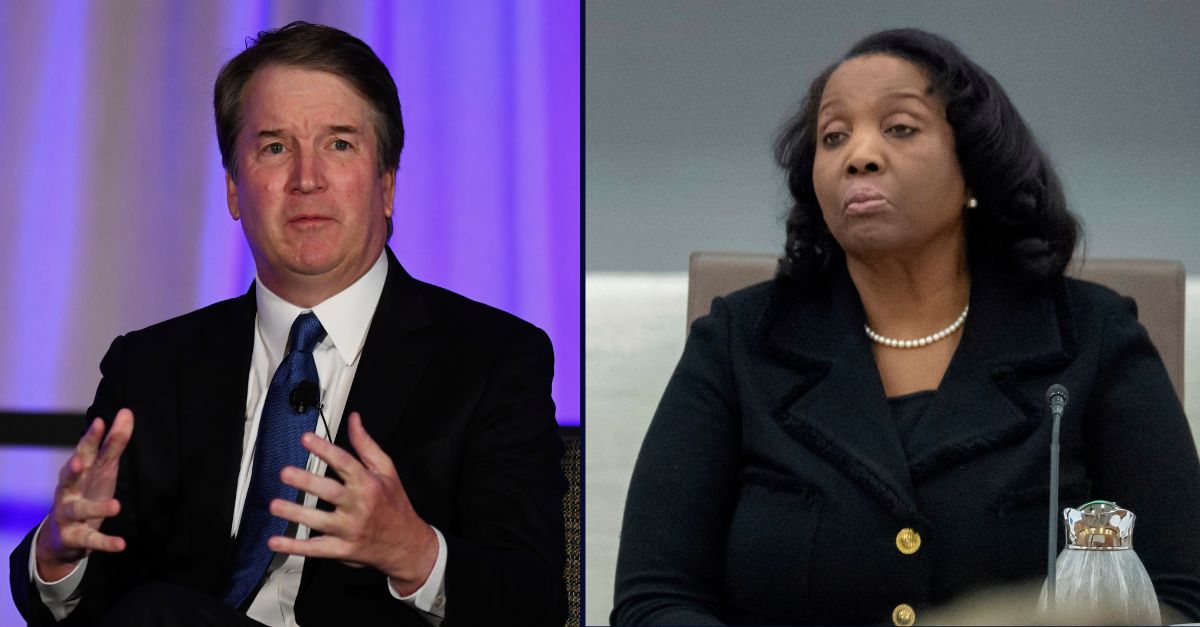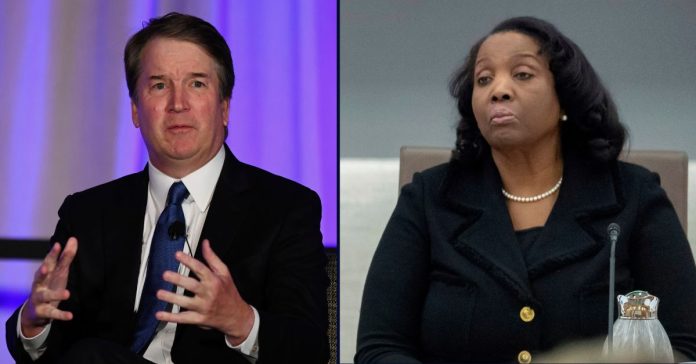
Left: Justice Brett Kavanaugh speaks at a panel at the Eighth Circuit Court Judicial Conference on Thursday, July 31, 2025, in Kansas City, Missouri (AP Photo/Nick Ingram). Right: Board of Governors member Lisa Cook, right, listen during an open meeting of the Board of Governors at the Federal Reserve, June 25, 2025, in Washington. (AP Photo/Mark Schiefelbein, File)
In an attempt to turn the tables on the Trump administration, Lisa Cook said in a court filing on Tuesday that President Donald Trump”s bid to fire her from her job as a Federal Reserve Board governor on the basis of mortgage fraud allegations should fail, in part, because former President Joe Biden’s White House had her disclosures in hand in 2022 and saw no reason then to pump the brakes on appointing her to office.
Cook’s attorney Abbe Lowell began his reply in favor of a temporary restraining order by stating, as he told U.S. District Judge Jia Cobb on Friday, that the Federal Reserve, the U.S. central bank and monetary policy agency, is a “uniquely structured, quasi-private entity” whose characteristic history of independence — as illustrated by relevant U.S. Supreme Court precedent and the Federal Reserve Act — means that board governors like Cook can only be fired for “cause” and that “cause” means “inefficiency, neglect of duty, or malfeasance in office.”
Lowell, who has represented Hunter Biden, Trump’s son-in-law Jared Kushner, and Trump’s nemesis Letitia James as New York’s attorney general faces similar mortgage fraud allegations, wrote that government’s preferred definition of cause — “any articulable justification that the President deems sufficient to warrant removal” — simply “cannot be right.”
Nor can it be right that Federal Housing Finance Agency Director Bill Pulte blasting out criminal referrals against Cook on social media, and Trump immediately responding by calling for Cook to resign or be fired, amounted to proper notice of the allegations against her and a hearing prior to termination, Lowell continued.
“This Court should reject the Government’s sweeping and unprecedented arguments and grant preliminary relief to preserve the status quo,” the filing said, before pointing to what the U.S. Supreme Court and its justices have said about the “unique” Federal Reserve.
According to Cook, Trump’s arguments in favor of an unreviewable removal authority as applied to Federal Reserve board members “leads to an absurd conclusion — namely, that the President has dramatically more power to remove members of the Federal Reserve Board than he does with almost all other independent agency officials, even though the [U.S. Supreme] Court has repeatedly recognized the uniquely independent status of the Federal Reserve Board.”
By way of example, the plaintiff cited a dissent from Justice Samuel Alito in CFPB v. Community Financial Services Association of America, in which the conservative justice’s footnote said the Federal Reserve Board is a “unique institution with a unique historical background,” and that its funding “should be regarded as a special arrangement sanctioned by history.”
Love true crime? Sign up for our newsletter, The Law&Crime Docket, to get the latest real-life crime stories delivered right to your inbox.
Next, Cook shouted out Justice Brett Kavanaugh and “Separation of Powers During the Forty-Fourth Presidency and Beyond,” a 2009 Minnesota Law Review article he published nearly a decade before he was confirmed to the high court.
Kavanaugh wrote that even if independent agencies should be more of an exception than the rule, the Federal Reserve Board “may be one example” of an agency that is rightly walled off from a president’s whims.
From the article:
To be sure, in some situations it may be worthwhile to insulate particular agencies from direct presidential oversight or control—the Federal Reserve Board may be one example, due to its power to directly affect the short-term functioning of the U.S. economy by setting interest rates and adjusting the money supply. It is possible to make a similar case, on similar grounds, for exempting other agencies from direct presidential control, and it also makes sense generally to treat administrative adjudications differently from policy decisions, rulemakings, and enforcement actions. Yet independent agencies arguably should be more the exception, as they are in considerable tension with our nation’s longstanding belief in accountability and the Framers’ understanding that one person would be responsible for the executive power. At a minimum, the implication of affording independence to such agencies should be carefully re-examined to avoid creating overlaps between independent and non-independent agencies for no apparent reason.
Turning next to the allegations that Cook “falsified bank documents and property records to acquire more favorable loan terms, potentially committing mortgage fraud,” Lowell issued a denial and insisted that because the alleged conduct predated Cook’s confirmation to the board, it can’t credibly constitute “cause” for firing, though impeachment is a potential remedy.
“Setting aside the fact that Governor Cook did not ever commit mortgage fraud, any such pre-office offense plainly would not have been ‘so infamous a nature, as to render the offender unfit to execute any public franchise,'” the filing said. “Pre-office conduct is addressed through the vetting process and impeachment. A thorough vetting by both the President appointing the nominee and the Senate before voting on confirmation should bring to light any pre-office conduct.”
“This allows the nominee to address the allegation to the individuals responsible for their placement on the Board, and removes the incentive to sit on evidence of pre-office conduct to be used for a subsequent administration to remove,” the filing went on. “And if pre-office conduct comes to light only after the vetting and confirmation process, members of the Federal Reserve Board can be impeached.”
The plaintiff denied the allegations as pretextual — that is, rooted in policy disagreements related to Trump’s desire to lower interest rates — and ultimately not based on new information.
According to Cook, “before she was appointed by the President and confirmed by the Senate,” the Biden White House and the U.S. Senate were in possession of disclosures that contained the “same purported ‘facial’ contradictions” about her homes that Trump has cited as “cause” for firing.
“A proper hearing would demonstrate that the Government had prior knowledge of the alleged facial contradictions in Governor Cook’s documents well before the President invoked them as the basis for her purported removal,” the filing said. “As the Government rightly acknowledges, such pre-office conduct ‘that was known at the time’ likely cannot constitute a legitimate basis for President Trump’s removal of Governor Cook.”
A footnote elaborated further on what a “proper” hearing on the mortgage fraud allegations would have revealed about Cook’s properties and how she listed them:
For example, at a proper opportunity to be heard, the SF-86 Supplemental Questionnaire submitted to the Government would show that Governor Cook listed the Michigan address as a “primary residence” and the Georgia address as a “2nd home.” Then, Governor Cook’s Electronic Questionnaire for Investigations Processing (e-QIP) submitted would show the Georgia address listed as her “present” residence, the Michigan address as her “present” residence and “current permanent residence,” and Massachusetts as her “present residence” but which “is now a second home and rental property.” Further, Governor Cook’s Nominee Report, U.S. Office of Government Ethics Form 278e, would list mortgage designations (as “Mortgage on Personal Residence”) for each of the relevant properties. If those are facial contradictions, as the Government and President claim, they certainly existed in the materials that Governor Cook provided as part of her Presidential vetting and Senate Confirmation process—for which Senators or White House advisors could have inquired of her about any alleged “facial inconsistencies.”

